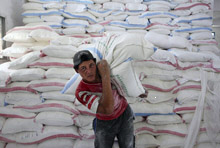
Typical street scene in Santa Ana, El Salvador. (Photo: iStock)
IMF Survey: IMF Endorses Accra Action Plan to Reform Aid Delivery
September 4, 2008
- Accra aid forum adopts agenda to accelerate reform of aid delivery
- IMF endorses agenda, saying political decisions now need to be taken
- Obstacles to achieving more predictable aid flows are surmountable
The IMF has endorsed a new action plan drawn up at an international conference in Ghana called to improve delivery of aid to developing countries.

Improving aid effectiveness, further scaling up development assistance essential to meet development goals, IMF says (photo: Newscom)
AID EFFECTIVENESS FORUM
The Accra Agenda for Action (AAA) was adopted at the end of the three-day High Level Forum on Aid Effectiveness held in Accra.
The Accra agenda emphasized the importance of deepening country ownership; building more effective and inclusive development partnerships; and achieving development results and accounting for them.
The forum agreed that country systems should be strengthened and used to the maximum extent; the fragmentation of aid should be reduced; and that aid should be further untied and made more transparent.
Specific commitments were made to
• Change, over time, the nature of donor conditionality to support ownership
• Increase the medium-term predictability of aid, and
• Strengthen developing-country capacity to lead and manage development strategies.
The forum also recognized that aid policies must be adapted to the specific requirements of fragile states, and committed to deepen the engagement of parliaments, civil society organizations, and other stakeholders in aid relationships.
"The IMF fully endorses the AAA and we will continue to support our member countries and the donor community in meeting the objectives laid down in the agenda," IMF Deputy Managing Director Murilo Portugal said in a statement in Accra. "Improving the effectiveness of aid together with further scaling up of development assistance will be essential to help low-income countries achieve the Millennium Development Goals."
The Accra meeting was held at the halfway point toward the 2010 target date set by the 2005 Paris Declaration on Aid Effectiveness. The Paris Declaration set 11 objectives for reforming aid delivery and management and achieving better results.
Delivery bottlenecks
"The process so far has been helpful in identifying bottlenecks in the delivery of aid and in its effectiveness; there is now a need to take the necessary political decisions to accelerate progress," Portugal said.
He noted that the IMF has called repeatedly on donors to enhance the medium-term predictability of their aid commitments, which was essential to achieving the MDGs."Donors and partner countries face obstacles to achieve more predictable aid flows, but these are surmountable, and the benefits of doing so will be considerable."
The action plan was compiled drawing on evidence-based reviews of the Paris Declaration implementation, and on discussions held around the world with both official and civil society organizations. Views of more than 80 partner countries, some 60 civil society organizations, official donors, and many non-traditional providers of development assistance fed into the document.
Low health spending
Earlier, Portugal told a forum panel discussion on financing of the health sector that Africa needs a significant increase in spending on health. He noted that health spending in Africa had "only increased marginally" from an average of 1.6 percent of GDP in 2000 to 1.8 percent of GDP in 2007.
"The IMF is in favor of increasing spending for priority sectors, including health," Portugal said September 2, adding that higher health spending is important for meeting the MDGs, three of which are health related.
Portugal stated that public spending on health is low in low-income countries, especially in Africa. He added that spending totals often do not aggregate all health-related expenditure, as much health spending is off budget.
Portugal said creating sustainable fiscal space for priority spending has been a key element of the IMF's policy advice in recent years. Countries have several options for creating fiscal space for priority spending.
Stress on predictability
Ministers from over 100 countries, heads of international financial institutions, donor organizations, and civil society organizations from around the world gathered in Accra for the aid forum. In months of preparation for the event, the IMF staff worked with others to help define a consensus on the meeting agenda, in particular stressing the need for predictable aid flows
Enhancing aid predictability remains one of the central challenges of the aid effectiveness agenda. Developing countries need firm and reliable commitments of available financing over the medium term to do their own planning and to link development strategies with budgetary frameworks and ensure aid money is used effectively.
Comments on this article should be sent to imfsurvey@imf.org


